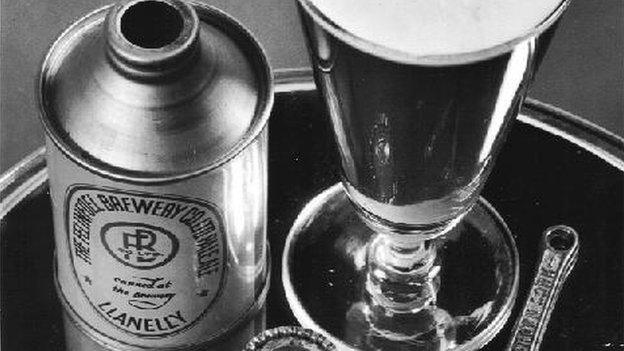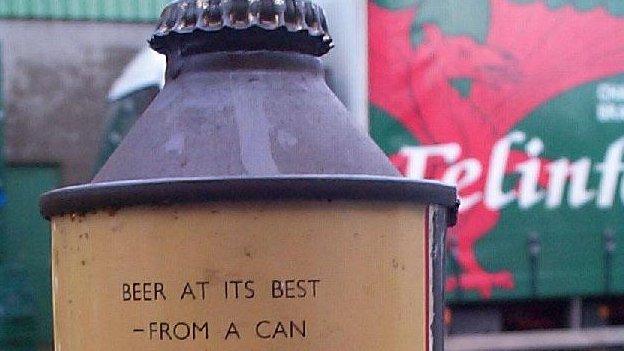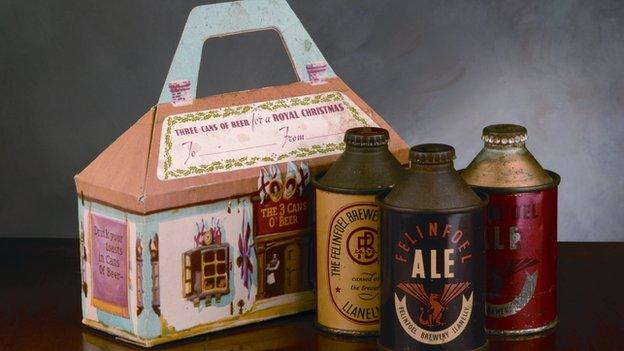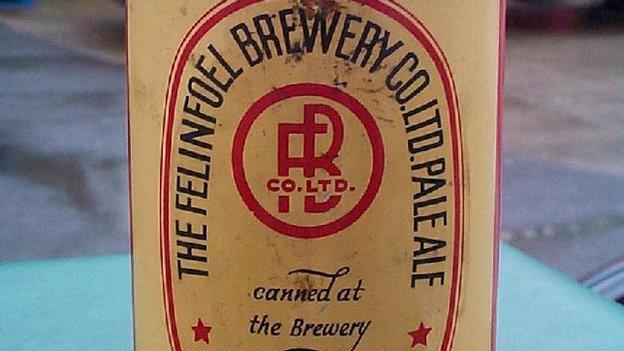Llanelli's Felinfoel brewery pioneered beer in cans
- Published

Felinfoel brewery's owners were also tinplate masters and beer cans were good for both businesses
They said it would never catch on. 'Beer in cans? Don't be ridiculous,' the doubters said.
But 80 years later, entire supermarket aisles are dedicated to canned beers, lagers, ciders and other alcoholic drinks.
It is now impossible to imagine how revolutionary the idea sounded in 1935.
That was when Felinfoel Brewery in Llanelli, Carmarthenshire, became one of the first in Europe to offer their wares in the shiny new packaging.
A year earlier, Krueger of New Jersey, America, was the first brewery in the world to sell beer in cans, but their product involved creating a new pasteurised drink to suit the metal containers.
On this side of the Atlantic, nobody had been able to counter the problem of British-style ales reacting with the tin and leaving a metallic taste.
But then Felinfoel hit on the idea of coating the inside of the cans with an inert wax.
'Space race'
However, this was not initially just about boosting sales of beer, but promoting another of the then-owner's business interests.
Current managing director Philip Lewis said: "As well as being brewers, the family who owned Felinfoel were also Llanelli tinplate masters, an industry which had taken a battering during the Great Depression of the 1920s and 1930s."
"After the success Krueger had gained from the launch of their canned beer, Felinfoel thought that if they could solve the reaction problems then they'd not only have a massive publicity coup, but also all the money they were currently spending on glass bottles would instead go directly into their tinplate interests.
"It became something of a space race, with Buckley's Brewery also keen to achieve the first.
"So when Felinfoel pipped them to the post, every employee of the brewery and the tinplate works was given a can to mark the occasion.
"These cans today are valuable collectors' items."

Some say melting wax inside cans first led to Felinfoel being given the nickname 'feeling foul' by soldiers
These half-pint tin bottles bore little resemblance to modern cans, which would not emerge until the 1960s.
But crucially, they were much lighter than their glass rivals, making them a firm favourite in supplies sent to British forces during World War Two.
Teething problems
While they proved a big hit in the UK, transporting them around the world posed its own problems.
"The wax coating worked well in the cold British climate, but when it was shipped to warmer climes such as the Far East, the wax would melt and seep into the beer, leaving an unpleasant taste," Mr Lewis added.
"After the war this drove brewers to develop the synthetic coatings used on modern cans."
While there were teething problems, cans were here to stay and more than 80% of beer drunk at home is now sold in them.

Cans allowed breweries to produce gift packs and sell beer in a way they had not been able to before
Despite this success, Mr Lewis has mixed feelings about his brewery's place in history.
"It's ironic that we were the brewery to pioneer canned beer and that today it's those same cans which are contributing to the decline of the pub," he said.
"In common with all breweries, we face an enormous challenge in getting people out of their houses and selling the pub as not only a place to buy beer, but as an entertainment experience."

Two Welsh breweries - Felinfoel and Buckley's - were both keen to produce beer in cans during the 1930s
The Beer Academy's Welsh beer sommelier, Tom Newman, takes a different view.
He believes that after decades as a vehicle for "stack 'em high, sell 'em cheap supermarket lager", the can is now helping micro brewers to fight back.
"For years, canning was very expensive and so only really leant itself to mass-market breweries.
"But today the cost has come right down with the invention of mobile canning lines and it's actually an incredibly good way to get craft ales out there," he said.
"The two enemies of ales are UV light and oxygen and, if done right, canning can counter these much more efficiently than bottling.
"In America there's already an explosion of micro-breweries selling their ales in cans and I think it's a matter of time until we see the same thing happening over here."